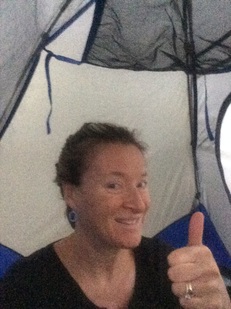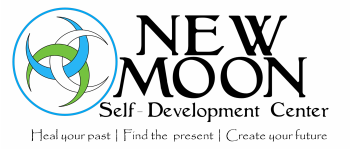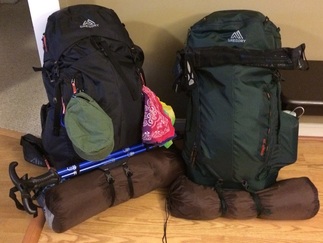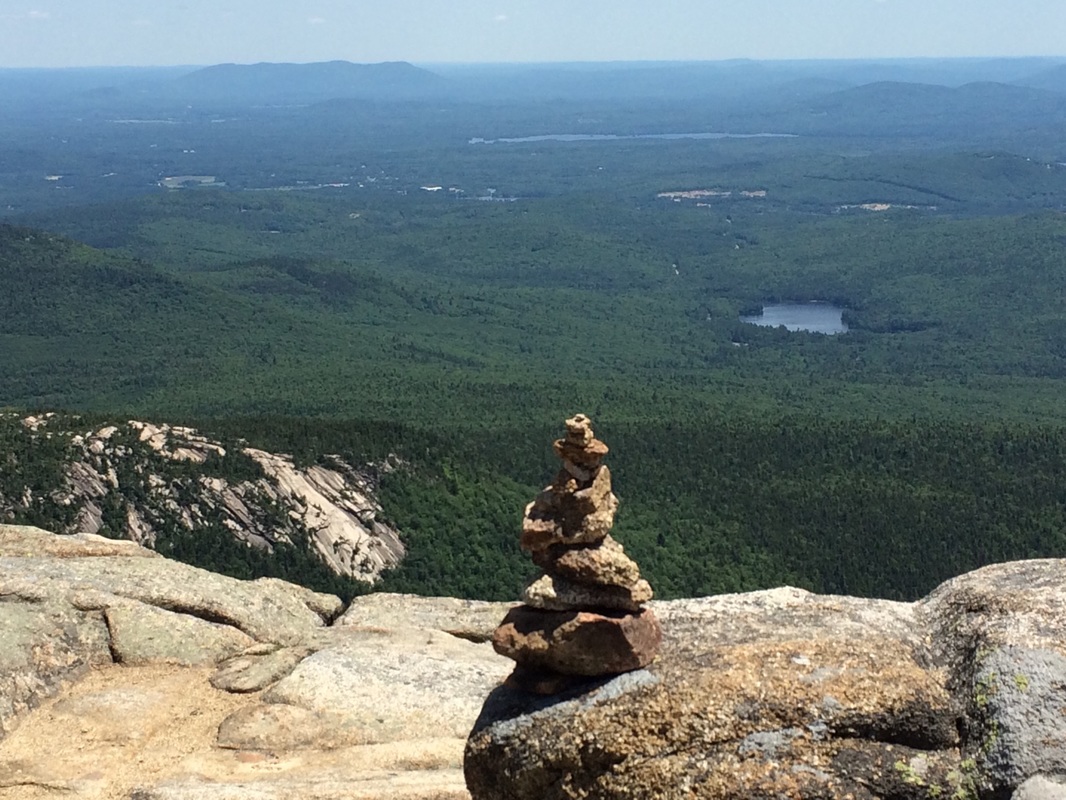
The first summer’s section hike (40+ miles in Maine) rocked me to my core. Physically, I had never before experienced being in true survival mode – the basic, core instinct that shuts down everything except what is necessary for survival.
It was day 3 of 5 and, with no way off the trail, my feet were shredded – I had blood blisters under 6 toenails that made every step excruciating. Carrying a 45 lb. pack on my back only added to the pressure on my toes. I recall, however, that in the moments when survival mode kicked in, I was not feeling my feet anymore. My body had somehow shut down that pain and was reallocating its resources in a most magical way. I made it out of the woods and resumed my everyday life, but the experience left me with a less-than-positive outlook on backpacking.
In my practice with New Moon Self-Development Center, I talk a lot about how our experiences can create beliefs which integrate into our identities. Once an experience is stored in the identity, our perception of the world and new/similar experiences will be filtered through the lenses of the past. The more emotion that is attached to the experience, the muddier the lens.
That being said, when my hiking buddy suggested that we tackle another section hike this summer, my first reaction was, “NO WAY!” My body and mind immediately sounded the alarms based on the one experience I had had in the past. This is what we call a “trigger” – even the mere question triggered a fight or flight response. The good news is that I understand triggers! Triggers are at the root of what I ultimately help all of my clients to recognize and deal with.
So, I looked at my trigger objectively. The fact was that my life was never in danger, and I had had everything I needed to survive. I also realized that, by making some adjustments and learning from my past experience, I could have a very different, more positive experience the next time.
I addressed the triggers that were shouting the loudest (pain/foot care being the top offender) and, with mindfulness and action, witnessed the trigger subsiding. I took control of the situation by carefully packing my pack and allowing myself a few “just in case” items that would help with the mental “what if’s” that popped up. With my pack weighing in at a whopping 48 lbs, but with peace of mind that I had everything I needed, I felt ready to build a new experience and push myself outside of my comfort zone once again.
Our most recent hike was certainly not easy – but my preparation minimized the trauma from my first hike and I had many realizations along the way. One of which is the point of this blog article:
There is something incredibly comforting when you realize that ALL of our basic needs can be carried on one’s back!
With food, water, shelter, clothing, first-aid supplies, and “just in case” items that ended up being superfluous strapped to my back, I got to thinking about minimalism.
Striving to live with less is counter to the common Western way of thinking. Most of us live lives of wanting the latest items, whether it be the latest cell phone, a new car, or an updated kitchen. Being free of the need for all of these things brings real peace. In fact, understanding and experiencing how little we actually need can give us immense gratitude for even the smallest of conveniences. Made a way of life, it could bring about some amazing benefits.
So, how could pairing down and getting into a minimalistic mindset help? It places an emphasis on family, friends, relationships, experiences, and personal growth. Accumulating possessions requires money – money requires work – work requires time, which takes time away from loved ones and experiences. Living beyond our means and constantly seeking THINGS also generates distraction (think the giant tv, video games, smart phone, etc.) which can easily pull us away from quality experiences and personal growth.
Becoming a minimalist could change your life in many positive ways:
1) You’ll have less debt. It’s not easy to find someone that isn’t worried about debt. Enjoying a large salary doesn’t seem to make one immune. Minimalists avoid the temptation to buy those things they don’t need and live within their means.
- If already in debt, adopting minimalistic practices will put you in a much better position to deal with it effectively.
2) You may discover more about yourself. The whole idea of minimalism is to strip away that which is unnecessary. Focusing on learning more about yourself becomes more interesting. By shifting your thinking from materialistic goals, you can discover thoughts, feelings, skills, and talents you didn’t realize you had.
3) Experience less stress and pressure. Living the life of a minimalist can reduce the amount of stress in your life. Having less debt and fewer possessions to get in your way enables you to relax and enjoy the little things.
4) Avoid pitfalls of chasing possessions and power. Western society is obsessed with big houses, fancy cars, beautiful people, and power. Ultimately, this culture creates the need to impress others. While having these things isn’t inherently inappropriate, the maniacal pursuit of them can be. An overemphasis on the pursuit money and power leads to suffering. Be happy and grateful for what you have and the suffering fades away.
5) Minimalism is good for the environment. On the trail, there is a “leave no trace” philosophy by which all hikers abide. It is quite amazing. Pack-in/pack-out – there are no trash cans. You want a cup of tea on the trail? Your used tea bag must be packed out. It makes you think about what you consume.
All of the energy required to heat and cool large homes comes at the expense of the environment. Everything that goes in the trash impacts the environment. Luxury cars tend to be less efficient and produce more exhaust per mile. When you consume less, you impact the environment less.
6) You can be more focused on others. With your own life feeling easier to maintain, your resources can be reallocated and be shared with others, such as your time and energy.
7) You can pursue more meaningful employment. If your need for income is decreased, a whole new world of opportunity and soul satisfaction is opened to you. The more you consume, the more you have to earn just to survive.
8) Your life becomes filled with people and activities that are meaningful. Eliminating the unnecessary creates more space for the things that matter. You’ll have more time and space for relationships and activities you enjoy.
9) The items you do own can be of much higher quality. You’ll find that by limiting the number of shoes, books, tools, and other things you own, you’ll acquire items of higher quality. More isn’t better. Better is better. There’s something satisfying about owning and using a high-quality item.
There is much to learn from the Appalachian Trail. There is no need to impress nature – nature doesn’t care. There is no need to impress other hikers – everyone on the trail is on their own journey and it matters not what brand of hiking shoes you’re wearing. The amazing “through hikers” that are out on the trail for 5-6 months have minimalism down pat. They have only what is essential in their packs and they’ve figured out a way to live on the land and discover themselves in the process.
Even a week on the trail will put things into perspective. I am stronger than I ever thought I was. I have more than I could possibly ever need in my non-trail life. There are comforts that we take for granted every day, and for which I will look at with a renewed perspective of gratitude. I want to remember the many lessons of the AT and be mindful of the minimalistic lifestyle. I know that I am not there yet, but instituting small changes will get me closer to living more simply.
Do you find yourself on a treadmill of living to or above your means? If so, perhaps living simply and with minimalism could help. Let everyone else worry about impressing the neighbors. You have more meaningful things to consume your time and attention!



 RSS Feed
RSS Feed